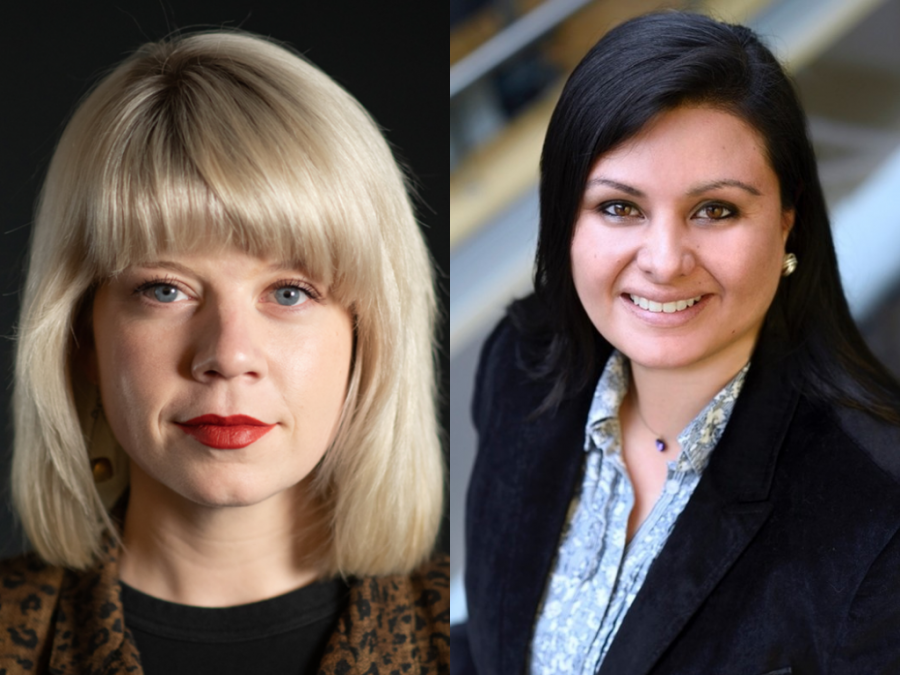LSHTM and Stanford announce the inaugural postdoctoral Fellows in Planetary Health to drive solutions for mental health and climate change
13 April 2021 London School of Hygiene & Tropical Medicine London School of Hygiene & Tropical Medicine https://lshtm.ac.uk/themes/custom/lshtm/images/lshtm-logo-black.png
Image of Britt Wray and Elaine Flores
If there is one silver lining to the COVID-19 pandemic it is that mental health has been given a limelight. With millions or even billions suffering the psychological consequences of social isolation, economic stress, and emotional strain, the world is reconsidering mental health and how we incorporate this in a green, sustainable recovery post-pandemic.
Climate change is severely affecting people in vulnerable countries and there are increasing mental health concerns gripping populations around the world, our youth in particular. Increasing worry over the looming existential dread of a warmer planet is so prevalent that it has even been coined eco-anxiety or climate dread, while the post-traumatic stress disorder caused by environmental disasters like wildfires or hurricanes is often referred to as climate trauma.
Recognising this, the Centre on Climate Change & Planetary Health at the London School of Hygiene & Tropical Medicine (LSHTM), together with Stanford University’s Center for Innovation in Global Health and the Stanford Woods Institute for the Environment, are proud to announce their inaugural postdoctoral Fellows in Planetary Health, Doctors Britt Wray and Elaine Flores-Ramos.
The Planetary Health Fellowship is a new joint post-doctoral programme created in 2020 by LSHTM and Stanford to support early-career researchers tackling pressing questions in the field of planetary health. This burgeoning field addresses the individual and population health outcomes created by anthropogenic climate change and environmental degradation, recognising that human health and environmental health are inextricably entwined and co-dependent.
With increasing pressure on countries to meet sustainable development goals and the emphasis on evidence-based policy, understanding these complex links is critical. The Fellowship program acts a nexus between these fields, helping the Fellows undertake the interdisciplinary research needed to propose novel solutions for safeguarding mental wellbeing.
“This was the only Fellowship I came across that was clearly articulating planetary health as its focus. To see that and the space to include mental health alongside the physical health attributes made it clear this was a very unique programme,” said Dr. Britt Wray. “The essence of planetary health is that it's very interdisciplinary. It demands an innovative environment with scientific rigor and multidisciplinary teams to create new strategies, tools, and interventions, and this fellowship has just that with two fantastic institutions that will be feeding into the research.”
Dr. Wray will be joined by Dr. Elaine Flores-Ramos, who is also focusing on the mental tolls of climate change in low- and middle-income countries. While Dr. Wray will focus on opportunities for developing a health intervention that will support young people struggling with climate related stress, Dr. Flores-Ramos will focus her research on women’s mental health in the Global South through mixed-methods and participatory research techniques to promote empowerment and action.
“We know that climate change effects have a detrimental impact to mental health, and women living in vulnerable areas are worse affected by this.” Said Dr. Elaine Flores-Ramos. “I have always admired LSHTM for its world-class interdisciplinary work and Stanford as a renowned global health leader. This fellowship will give me a unique platform to strengthen environmental mental health research focused on low- and middle-income countries, contributing to solutions for global health and climate change.”
Together, Dr. Wray and Dr. Flores-Ramos will split their time over the next two years between LSHTM and Stanford, taking advantage of the many unique resources of each institution, such as Stanford’s robust programs in environmental science and LSHTM’s expertise in global health and epidemiology and its integral presence in low-and-middle-income countries around the world.
“This Fellowship scheme will inject energy into the field of planetary health,” said Dr. Michele Barry, director of the Center for Innovation in Global Health and Senior Associate Dean for Global Health at Stanford University. “There is not much research at the intersection of climate and mental wellbeing, and by beginning with two outstanding Fellows focused on that area of study, we are starting off with a collaborative environment that will lay the groundwork for this critically important space.”
While this year’s Fellows will focus on mental health and climate change, the Planetary Health Fellowship will continue on in future years with a commitment to selecting a diverse array of Fellows, expanding on many areas in the field of human and planetary health, while also designating half of all Fellowship positions to individuals from low- and middle-income countries.
“Appointing two exceptional Fellows in mental health and climate change is extremely exciting and promises to lead to important breakthroughs in this under-researched area of planetary health.” Said Prof. Alan Dangour, Director of the Centre on Climate Change & Planetary Health. “Our ambition is that our new partnership between LSHTM and Stanford is the first exciting step in building a global network of brilliant Planetary Health Fellows who can deliver innovative research to support essential policy actions to tackle the growing impacts of climate change and protect the most vulnerable people and communities around the world.”
The Planetary Health Fellowship will be accepting applications again for the 2022 academic year in the summer of 2021. Stay tuned for updates by subscribing to our newsletter and twitter feed.
This research is funded in part by the Gordon and Betty Moore Foundation, Sean N. Parker Center for Allergy and Asthma Research at Stanford University, and The Burke Family Trust.
If you enjoyed this article and would like to build a career in global health, we offer a range of MSc programmes covering health and data, infectious and tropical diseases, population health, and public health and policy.
Available on campus or online, including flexible study that works around your work and home life, be part of a global community at the UK's no.1 public health university.

